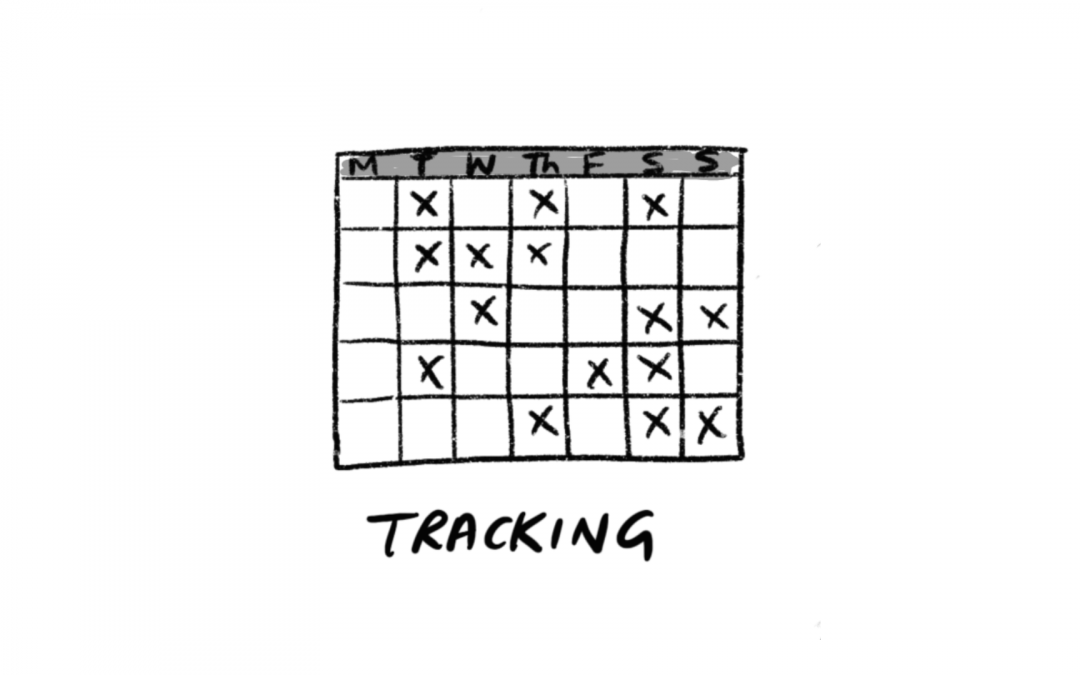Tracking can be a powerful tool for behaviour change. It helps you build writing habits and routines, improve your productivity, and make you feel more positive about writing – which means you’ll be more likely to continue. Get started with this complete guide to tracking your writing, where we explain how to notice, reflect and modify your writing practice.
What is tracking?
Tracking is a powerful tool for behaviour change. It’s been proven to help people change their habits and routines. It took off with smartphones and in the last decade everyone from your grandma to her dog could track their health, diet, or exercise.
But it’s not just your health that benefits. Tracking your writing helps you understand patterns and use that evidence to make the most of your time and energy.
Tracking simply involves checking in after each writing session and making a note. How you track is up to you. Some writers like to note things down in a diary or journal, others prefer tech and use apps or online solutions.
The benefits of tracking your writing
By tracking you build up data that can help you identify patterns about your writing. You start to understand what frequency or optimum length of session works for you. Other things emerge too, for example, what time of day is best, when your energy levels are high and when they are low.
Start small by tracking your writing over just five days – you should see some patterns emerge.
If you need persuading, the benefits of tracking include helping you to:
- monitor what’s important to you
- gather feedback to adjust your expectations
- set realistic goals based on evidence rather than make faulty predictions
- stop unhelpful comparisons and feelings of guilt and disappointment
- develop a regular writing practice (whatever that means for you)
- keep going by showing progress which in turn spurs you on to improve
>> Read more: How to make time to write – 4 approaches to finding time in busy schedules
Reflection – how to power up your tracking
To get the most of tracking you need to turn evidence into action. There are three steps to this, starting with noticing, then reflecting and modifying your behaviour.
“Turn evidence into action. There are three steps to this, starting with noticing, then reflecting and modifying your behaviour.”
1. Notice
At the end of a writing session don’t rush off to the next task, but take a moment to pause and check in with how it went.
There’s lots of things you can notice, from when, where and what you write, to how much you write by logging word count, number of pages or length of writing session.
This isn’t a test. There’s no right or wrong way to write. You’re just observing how you write, so don’t judge. The important thing is to gather some insight that will power up your writing practice.
2. Reflect
When many people think of tracking they focus on data – countable things like words, pages or time. However, to unlock deeper insights it helps to use open questions for reflection.
We’ve found the following questions can unlock powerful insights. Ask yourself:
- What went well?
- What didn’t go so well?
- What can I do next time?
As you come to the end of a writing session, make a brief note to reflect on how it went – the good and the bad – and what you’ll do next time.
You might like to reflect on practical details, such as date, time, place, how long you wrote for and perhaps what and how much you wrote.
You can also reflect how you feel by noticing your energy, focus and flow – how easy or hard it was to write. Did you procrastinate or experience any blocks? If so, notice what they were and if you did something helpful to overcome them. Did you have any negative thoughts or doubts – note them down.
Finally, as you finish up, get specific on what you’ll do next. Having a clear next step and knowing what to write will get to back into the writing process quickly. This step can incorporate some of your learning about what works and what doesn’t so you can double down on the beneficial things and avoid the bad.
“As you come to the end of a writing session, make a brief note to reflect on how it went – the good and the bad – and what you’ll do next time.”
3. Adapt
Noticing and reflecting will give you evidence to work with.
This approach is used by people in all walks of life to learn and improve what they do – from a weightlifter who’s trying to increase their strength by logging weight and reps, to someone managing a health issue like diabetes, or military personnel who debrief after every exercise in training and on the field. Learning what is working – and what isn’t – helps people to adapt their behaviour.
“Learning what is working – and what isn’t – helps people to adapt their behaviour.”
For example, you might very quickly pick up on some patterns, if like me you spot you’re a morning person you’ll notice that writing at night is more stressful than it’s worth. So, schedule writing times first thing when you feel productive and not yet distracted by the demands of the day.
You might find that you have an optimal length of writing session – is twenty minutes your sweet spot, can you power on through for two hours, or do you need a whole day to get to grips with your research? Adapt your routine to allow enough time.
You might spot some tendencies in what distracts you. Did you sit down to write and end up editing your end notes or researching a character’s family tree? Knowing when and how you procrastinate will help to squash those distraction gremlins when they creep towards your desk.
>> Read more: How to stop procrastinating for good: a guide for writers
Finally, by spotting patterns in your thoughts you can knock negative thinking on the head. In psychology a worry diary is used to manage anxiety – likewise, writers can apply this to their own writing worries. Each time you spot a negative thought, note it down – it will stop you churning it over. These worries can often help when you start editing – think of them as notes for your future self. The point is, you don’t need to worry about them now and by writing them down you’ve reassured your inner critic that you are listening and will deal with them when the time is right.
Make reflection a habit
Make reflection a habit by tying it to something you already do. Just before you finish up writing for the day use reflection as part of your close-down routine. Throw in a nice reward when you do it, like a good cup of coffee, and you’ll soon embed this practice.
There’s no need to buy expensive tools – a simple notebook and pen will do. By all means go digital, use your notes app, an online tracker like Streaks.
Pro tip: all the good things
Having negative thoughts and emotions can have serious impact on your health. Marc Brackett, founding director of the Yale Center for Emotional Intelligence, wrote in his book Permission to Feel, that “Negative emotions have been associated with hypertension, increased heart rate, constriction of peripheral blood vessels, unhealthy blood lipids, and decreased immune system function.”
And the reverse is true, positive emotions make us both healthy and happy.
Our first question for reflection looks at what went well. This alone will give you a small rush of endorphins, but to increase that positive well-being, you should identify three good things, according to Professor Martin Seligman, founder of positive psychology.
Seligman, a psychologist at the University of Pennsylvania, tested the impact of various positive psychology interventions. In one study, he got participants to write down three good things each day; the positive impact of this exercise was still measurable six months after they had stopped doing it.
One of the reasons this exercise has such long-lasting effects is that it conditions you to notice good things. If you do this as part of your writing practice you will start to associate positive emotions with writing.
Feeling good about your writing will keep you motivated to continue, and that will keep you going for the long term.
“Feeling good about your writing will keep you motivated to continue, and that will keep you going for the long term.”
A guide to tracking your writing
Track by making a few notes celebrating what went well, noting what didn’t work, and reflecting on how to adapt and change in the future. Don’t dwell on your mistakes but accept them, learn and move on.
Modify your plans, perhaps the time or day you write, how much or for how long, what you do at different times of the day. Learn from what works – and doesn’t work – for you.
There’s no one size fits all advice for writing. You are unique, as is your writing, so your practice needs to work for your own special quirks and habits. Tracking your writing will help you transform your writing practice for the better – and for the long-term.




